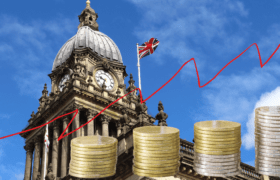Rising prices in the UK have reached their highest level in 40 years, which is having an impact on economies all over the world. Indian, which has many ties to the UK, is one of the countries keeping a close eye on this economic growth. This blog post talks about how rising inflation in the UK might affect India’s trade, investments, currency, and the wider social and political scene.
Problems with trade:
What this means for Indian exports: The UK is one of India’s most important trade partners. If UK inflation stays high for a long time, the pound could get weaker, which would make Indian goods sold in the UK more expensive for UK customers. This might make people less interested in buying Indian goods, which would be bad for India’s businesses that depend on exports.
Costs of Imports: On the other hand, UK inflation could make it more expensive for India to buy goods and services from the UK. This could hurt the budgets of Indian shoppers and companies that depend on British goods.
Trade Balance: The combined effects on exports and imports could throw off India’s trade balance with the UK, which could lead to trade imbalances and hurt the country’s economy as a whole.
Climate for Investment:
Foreign Investment: India has gotten a lot of foreign investment from the UK in the past. But UK companies might not want to invest in the Indian market if inflation is going up because it could hurt their returns.
Impact on the economy: A drop in foreign investment could hurt India’s economy in many ways, such as by slowing down growth and reducing job possibilities.
Effects on the currency:
Rupee Depreciation: The Indian rupee is pegged to a group of currencies, such as the British pound. If inflation stays high in the UK, it could cause the rupee to lose value. This would make imported goods more expensive and make Indian companies less competitive on the world stage.
Problems with Imports: If the rupee falls, it could become more expensive for India to bring in goods and services that it needs. This could affect everything from hospital supplies to energy sources.
What this means for society and politics:
Poverty and Inequality: As the cost of living goes up, especially for people with lower incomes, the economic effects of UK inflation could make poverty and inequality worse in India.
Unrest in Society: Hard times financially often cause unrest in society. Protests and demonstrations could be sparked by rising prices, unemployment, and income disparities, which could threaten government stability.
Measures by the government:
The Indian government is not just watching what’s going on. It is taking deliberate steps to lessen the effects of inflation in the UK:
Boosting Domestic Production: India is working to increase domestic production so that it can become more self-sufficient and less dependent on imports.
Getting Foreign Investment: India is actively seeking foreign investors from other countries, like the US and Japan, to make up for any possible drop in UK investments. This is done to increase the country’s sources of foreign capital.
As UK inflation hits its highest level in 40 years, its effects can be felt all over the world, including in India. Because of the complicated web of trade, business, and currency links between the two countries, big changes in the economy of one can have a big impact on the economy of the other. Even though India is taking steps to deal with these tough problems, there’s no denying how complicated the situation is.
The fact that inflation is going up in the UK is a good warning of how the world economy is linked. It shows how important it is for countries to work together to solve economic problems and keep financial systems stable. For India, it’s a call to change with the times, come up with new ideas, and work together as the economy changes. They hope that being resilient and following smart policies will help them weather the storm and ensure a safe economic future.



